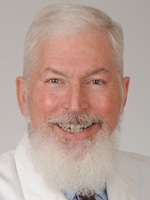August 2022—Running into the reality of staffing. Those are the words of a pathologist who said in the most recent Compass Group roundtable that its health system is making a push to obtain and test specimens “as close to home as possible.”
Another Compass Group member said planning is underway for the new hospitals his system is going to build, “but we don’t know where staff will come from.”
Here is what they and others told CAP TODAY publisher Bob McGonnagle on July 5 about not only the larger plans but also about plans for a new staffing schedule, monkeypox (before the WHO declared it a public health emergency), and budgets. All while COVID cases continued to climb.
The Compass Group is an organization of not-for-profit IDN system laboratory leaders who collaborate to identify and share best practices and strategies.
The big headline is monkeypox—it’s moving quickly. John Waugh, has Henry Ford put out information for its physicians and patients?
John Waugh, MS, MT(ASCP), system VP, pathology and laboratory medicine, Henry Ford Health System, Detroit: We publish documents internally that provide guidance to our medical staff, and the next edition should be out within a day. It will have guidance from the Michigan Department of Health and Human Services, and it’s largely sharing what has come out from the CDC. There are a lot of channels of information at the state and federal levels, and we’re trying to distill it for our medical team.
Are your testing protocols for monkeypox in good order at the moment?
John Waugh (Henry Ford): They are not at the moment, but we are working on them. The information that has been shared at the state and federal levels is on when to collect, what to collect, how to do that, how to transport. A number of companies are working on in vitro diagnostic methods. Cepheid is working aggressively on finalizing a method. It’s not going to be a COVID-testing–type market; it’s a more limited scale of production.
Diana Kremitske, you cover a large area—any word from Geisinger on monkeypox?
Diana Kremitske, MS, MHA, MT(ASCP), VP, Diagnostic Medicine Institute, Geisinger, Danville, Pa.: We have not had requests for testing so far. We’re coordinating with public health departments to get information on specimen requirements to our clinical partners. [Kremitske informed CAP TODAY on July 25 that a few cases have since been diagnosed.]
Julie Hess, what about AdventHealth?
Julie Hess, VP, laboratory services, AdventHealth, Orlando, Fla.: The way our system is structured, we have one infectious disease doctor who will see these patients for the foreseeable future. We’re asking patients to come in one day a week, and then we’ll do the required testing.
Florida appears to be looking to the health care systems to help define and manage it.
Leaving health care systems out of COVID early on added fuel to the fire. Maybe this is a mistake they are determined not to make again.
Julie Hess (AdventHealth): I think we’re all trying to figure out how much this will spread. We haven’t decided whether we’ll bring this testing in-house. We’re connecting with our local county epidemiology about what the criteria are for testing and sending the sample to the CDC.
Vandita Johari from Baystate, what news is top of mind? Is it monkeypox or COVID?
Vandita Johari, MD, medical director, Baystate Reference Laboratories, Springfield, Mass.: It’s mainly staffing, especially turnover at the front line—phlebotomy, accessioning, and processing staff. It’s harder to meet our clinical service promise of turnaround time given that the front line is turning around so quickly.

Dr. Johari
Is your reference lab open everywhere, with patient service centers, clinics, et cetera?
Dr. Johari (Baystate): Yes. We are a five-hospital system, and we service the emergency department, inpatients, and outreach. The outreach is fine for now, but the challenges that face our inpatients and emergency department are creeping into outreach areas as well.
Monkeypox is a conversation around specimens. We have a tight relationship with our infectious disease service, and our chief epidemiology officer works with our microbiology medical director, but monkeypox is not an issue as of yet.
Johan Otter of Scripps, how are things on the West Coast?
Johan Otter, DPT, assistant VP, Scripps Health, San Diego: Staffing is our number one issue, and it’s only getting worse. In particular at the lower end of the pay scale, we’re seeing competition with private industry or other hospital systems nearby. Kaiser is opening a new hospital in San Diego and already recruiting.

Dr. Otter
The cost of real estate is the other challenge. San Diego has always been expensive and it’s doubled in the last three years. None of us can live around our hospitals, so people are traveling an hour to an hour and a half one way. With the gas prices, it’s a big challenge.
We’re at 16 percent positivity for COVID; other hospitals are at 20 percent. We’re seeing a lot of asymptomatic positives—one out of 10 patients we test has no symptoms and tests positive prior to procedures. Case numbers are still rising.
Have there been many hospitalizations related to this?
Dr. Otter (Scripps): Not as much but, again, it goes back to staffing. We end up with a staffing crisis not just because we can’t hire folks or hold on to people but also because we work with skeleton crews in some areas.
Sterling Bennett in Utah, tell us about monkeypox in your area.
Sterling Bennett, MD, MS, senior medical director, pathology and laboratory medicine, Intermountain Healthcare, Salt Lake City: We’ve had a handful of cases in Utah. We’re set up and have communicated with our providers about how to handle a suspected case. Specimens are referred to the state laboratory, and I believe they refer them to the CDC. We need approval from the state lab before they will accept a specimen, so our main communication with our providers has been: If you suspect monkeypox, get involved with infectious diseases and they’ll help you get involved with the state. If you get approval for testing, we’ll help you handle the logistics of the specimens.
Is COVID still peaking in Salt Lake City?
Dr. Bennett (Intermountain): Total number of cases is slightly increasing as are our testing and hospitalizations. The biggest impact we’re seeing is with staff absenteeism. Every day people are out with COVID.
Sam Terese from Alverno—are you seeing absenteeism from COVID?
Sam Terese, president and CEO, Alverno Laboratories, Indiana and Illinois: Across the system, we see peaks and valleys of absenteeism related to COVID where it moves through a particular laboratory, so we have to reallocate staff in the worst case, or the local team goes the extra mile. We are blessed to have a dedicated workforce. Many of our hospitals still have masking requirements while we’re going through high numbers of positive employees. It will be part of our future for years to come.
In terms of monkeypox, we are coordinating with our state labs when testing is needed, and we’ve sent out a handful of samples. Similar to what Sterling was saying, the state must approve accepting them, and we’ve communicated that to our medical staff. We don’t have plans to develop testing. Several reference labs have started to offer testing.
We’re moving deeply into the budgeting cycle for labs for next year. By deeply, I mean maybe even over our heads. We know we have serious staffing issues that will require money, but I’m interested in what overall inflation, apart from staff, you’re facing as you put budgets together.
Sam Terese (Alverno): From an inflationary perspective, by far staffing is the worst-case scenario. A lot of our contracts with suppliers are long term; we don’t have many that are less than seven or eight years. We’ve been able to build in some protection, so we’re not seeing the worst of it in supply chain. A few have increased their rates. With our logistics people, we have fuel surcharges in play and we’re working through them but also looking at optimizing routes with a logistics partner. There is a lot of pressure to find savings to offset inflation and shifting volumes.

Dr. Carroll
We’re looking at expanding capital acquisitions, particularly adding in automation at sites where we would not have thought automation made sense, such as in 200-bed hospitals. As we renovate a few laboratories, expanding automation is, in general, part of the discussion. We’re adding more analyzers to lines and doing a lot with machine learning and robotic process automation, where we have computers reading acquisitions and keystroking. It’s working better with printed materials but not very well with handwritten materials. We’re trying to find savings opportunities wherever we can.
Steve Carroll, how are things in Charleston?
Steve Carroll, MD, PhD, chair, Department of Pathology and Laboratory Medicine, Medical University of South Carolina: COVID spiked significantly for us. Testing positivity in the last few days has been 25 to 26 percent. We seem to be on the way down.
The staffing problem is exacerbated by COVID as well as the overall marketplace and finding personnel—histotechnologists seem to be a particular problem.
Since COVID caught us so badly the last time around, we are being proactive with monkeypox. Julie Hirschhorn [PhD, director of molecular pathology] heads that unit and is getting quotes, and we are planning to set up testing in-house in case we do see a surge. I set up a test development lab within the department, and one of its tasks is to prepare testing for emerging pathogens. It also doubles as a resource for my faculty to do research, so it’s a win-win.
Are you masking in the laboratories now?
Dr. Carroll (MUSC): We had a period in which we did away with masks, then the spike came, so now masks are back in patient-facing areas and in the laboratory.

Beylo
Frank Beylo, what’s the mask situation at Inova, and what else is top of mind for you?
Frank Beylo, BS, MT(ASCP), director, operations and technology, Inova Health Systems, Falls Church, Va.: Mandated masks for all staff—we haven’t relaxed anything yet.
Staffing is a huge concern. Our system is heavily recruiting international medical laboratory scientists, similar to what was done during COVID for nursing and other positions. We’re also looking at implementing alternate schedule options for our MLS team members that is similar to nursing—three 12-hour shifts covering Friday, Saturday, and Sunday, off four days, with full-time benefits plus additional shift differential—to see if we can get staff to help cover our weekends. The concern is whether we will be robbing Peter to pay Paul with any current team members wanting to transition to this role, so I don’t know how much we will gain or when this will be approved, but we are trying to be creative.
We have a robust medical laboratory science program. We graduated eight students and were able to hire all of them. Two years ago we started a histotechnology training program; three students graduated this year and we hired them. Last year we started a phlebotomy training school. It has seven applicants and we are hiring them all. We’re doing our best to grow those positions internally, but we’re still struggling.
Last month we talked about having to close patient drawing centers, service centers, or the possibility of having to do so. I’ve heard reports that some point-of-care laboratories have had to close in some of the large systems. Have you kept all your working sites up and running so far?
Frank Beylo (Inova): We haven’t closed any that I can think of. We recently opened a lab in one of our cancer centers, and we’re building three more hospitals in the next four to seven years. We’re planning for those, too, but we don’t know where staff will come from. We will try to grow staff while also looking to add automation. Many of our techs are approaching retirement, so we have to address that.

Dr. Anthony
Lauren Anthony, what is the monkeypox situation in Minneapolis?
Lauren Anthony, MD, system laboratory medical director, Allina Health, Minneapolis: We had a probable case over the weekend. Several cases have been reported in Minnesota. The health department is local, and it has epidemiologists on call 24/7. They want to be notified of a suspected case.
We connected the clinician with the state health epidemiologist, who provided instructions about collecting swabs of the lesions. No lab testing or blood testing had been ordered on the patient, so the clinician recognized that and didn’t order tests.
We are communicating with the state health department for guidance on what samples to collect and tie them in with infection prevention.
We’ve been dealing with a critical shortage of metal-free tubes needed for collecting serum zinc, copper, and selenium, so we’ve put restrictions on those orders. You can use a lavender top for toxic metals, where you’re looking for an elevated level, but we have an alert to block orders for deficiency testing and we’re asking providers to wait three months. Usually they’re doing nutritional testing—you’re looking for a deficiency there, and it doesn’t make sense to collect it in a questionable tube.
As you work collectively at Allina toward your budgets for next year, how bad does it look? What is your wish list? And do you think you’ll be able to meet your administration’s demands?
Dr. Anthony (Allina): We’d like to replace our 10-year-old chemistry line. There’s increased downtime, and we’re waiting on it to implement high-sensitivity troponin.
Diana Weyhrauch and Milton Datta, tell us how you’re putting plans together for a new chemistry system at Allina.
Milton Datta, MD, chair of pathology, Abbott Northwestern Hospital, Allina Health, Minneapolis: I’ll talk big picture. One of the big pushes at Allina Health is to transition to moving care as close as possible to the house that patients live in. We’re trying to protect the ability to collect the specimens as close to home as possible and run those tests, but we’re running into the reality of staffing. Diana has been leading the charge to make difficult decisions on that. And we’d love to have the technology, as Lauren said.
There’s an emphasis on building out the Allina Health Cancer Institute; it is being pushed from the top. We feel like the support there is strong, as it is a keystone for our patients’ care. Lauren’s biggest job is to manage expectations. When there is a New England Journal of Medicine article about liquid biopsy results, you have to manage everybody who comes running in saying, “We have to have that yesterday, and it’s going change the world.” It may, but it will take a few years.
Our staff have been hit by COVID, even among pathologists. We’ve been short-staffed quite a bit and have been trying to adjust for these staffing levels. We now do more virtual cases, which has helped—intraoperative support for our staff and surgeons at our regional and community hospitals is up. Over 30 percent of our total visits are now done by pathology assistants virtually in real time with pathologists.
We have great pathologists who retired and we’ve asked them to help us cover for a couple of weeks, and they’re happy to do that.

Weyhrauch
Diana, what are some of your thoughts as you put these details together.
Diana Weyhrauch, MLS(ASCP), senior director of laboratory operations and technology, Allina Health, Minneapolis: We’re looking at it from multiple angles—staffing, clinical, and financial impacts. From a staffing perspective, we are looking at what we can do to improve efficiency for the current staff. We’re looking at different programs to get more people in the door and get them excited about laboratory medicine, and that includes working the education front, trying to get into junior high and high schools.
We are also looking at it from financial and clinical perspectives. We’re evaluating the three legs of the stool to ensure we make a good decision. These contracts are typically in place for a while, so you want to make the right decision. You don’t want to replace your automation every few years.